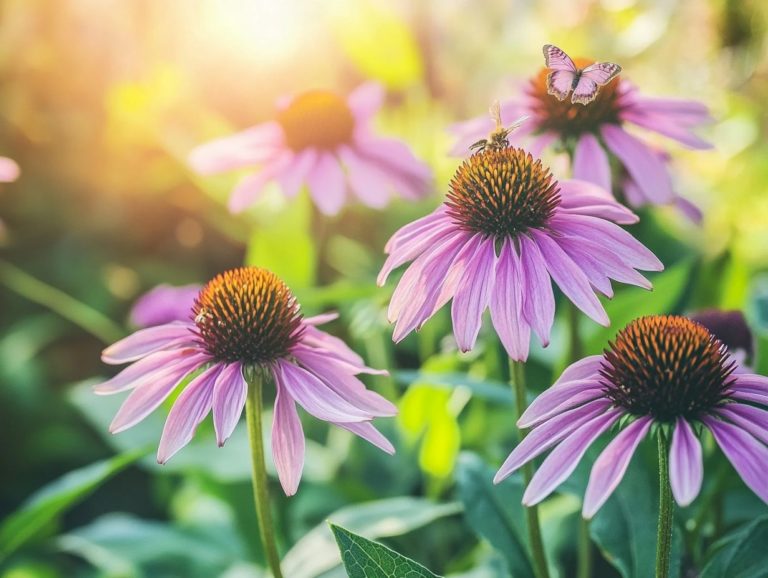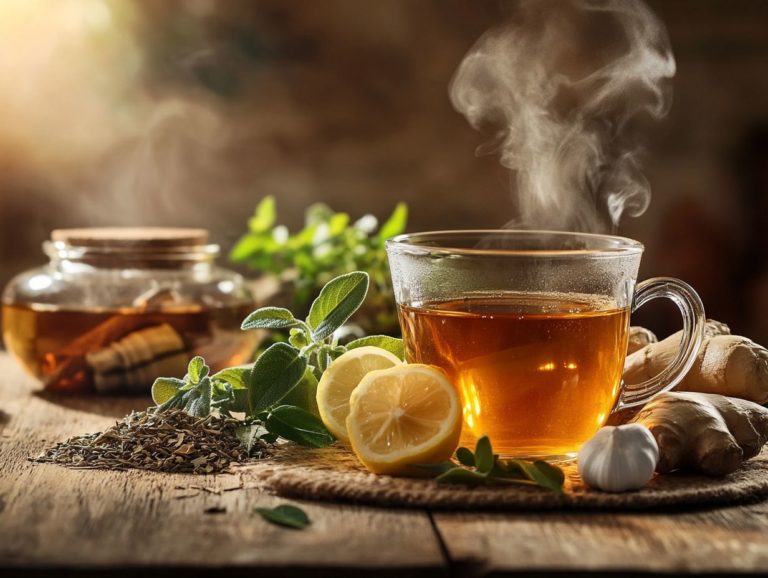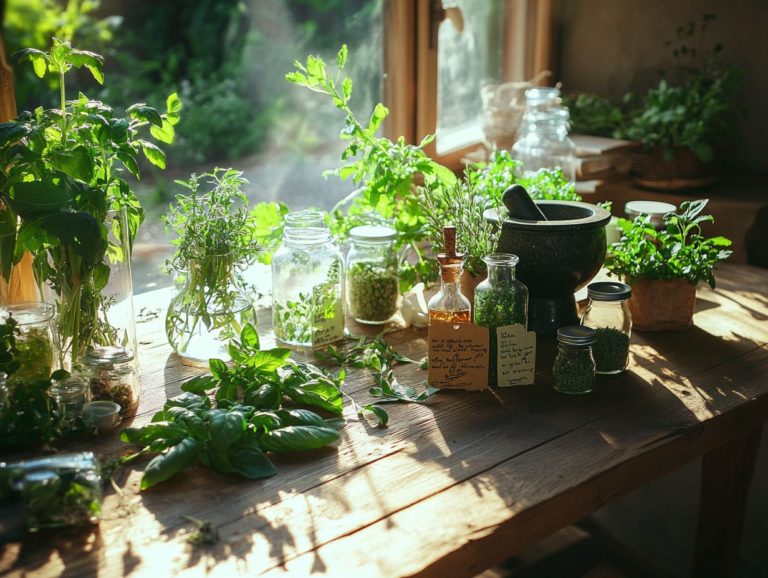Top 5 Herbs to Boost Your Mood
Feeling a bit down or overwhelmed? Rest assured, you’re in good company. Many individuals are turning to the solace of nature, and specific herbs have shown promising effects on mood enhancement.
Discover five amazing herbs that could boost your mood St. John’s Wort, Ashwagandha, Rhodiola Rosea, Saffron, and Ginkgo Biloba. This article covers how these herbs work, potential risks, and practical tips on smoothly incorporating them into your daily routine.
Uncover the ideal herb for your unique needs and embark on your journey toward a brighter mood. Don t wait to feel better find out how these herbs can change your life today!
Contents
Key Takeaways:

- St. John’s Wort is a well-known herb for improving mood and reducing symptoms of depression.
- Ashwagandha is an adaptogenic herb that can help manage stress and anxiety.
- Rhodiola Rosea has been used for centuries to enhance mood and improve mental performance.
1. St. John’s Wort
St. John s Wort holds a notable place in herbal medicine as a natural remedy for mood enhancement, particularly in addressing anxiety and depression. This makes it essential in discussions about mental health and emotional well-being.
Historically, this remarkable herb has been used since ancient Greece for its uplifting effects. Studies suggest its active compounds, particularly hypericin and hyperforin, possess antidepressant qualities. Evidence is growing to support its effectiveness compared to conventional antidepressants.
St. John s Wort is generally well-tolerated, though some may experience side effects like stomach issues, fatigue, or photosensitivity. It’s an intriguing alternative that can complement traditional approaches, so consult with a healthcare professional before trying it.
2. Ashwagandha
Ashwagandha is an ancient adaptogen known for its ability to alleviate stress and anxiety, enhancing emotional well-being and resilience.
This powerful herb works primarily by modulating cortisol levels in your body, the hormone at the core of stress responses. Traditionally used in Ayurvedic medicine, ashwagandha promotes vitality and supports mental clarity.
Recent studies validate its benefits, emphasizing its potential to uplift mood and enhance cognitive function. A typical daily dosage ranges from 300 to 600 mg of its extract, but consult with a healthcare provider to navigate potential interactions.
3. Rhodiola Rosea
Rhodiola Rosea is a remarkable adaptogen known for its positive effects on mental health. If you re looking to combat stress and enhance cognitive function naturally, this herb might be your new best friend.
Originating from the Arctic regions of Europe and Asia, Rhodiola has a rich history of use, particularly in folk medicine among the Vikings. It has long been employed to alleviate fatigue and boost endurance, supporting overall wellness. Recent studies corroborate its ability to reduce stress levels and improve cognitive clarity.
Approach its use with caution. Some may experience mild side effects like dizziness or dry mouth, and it may not be suitable for everyone, particularly those with certain health conditions or taking specific medications.
Start your journey to a happier mood today choose the herb that resonates with you!
4. Saffron
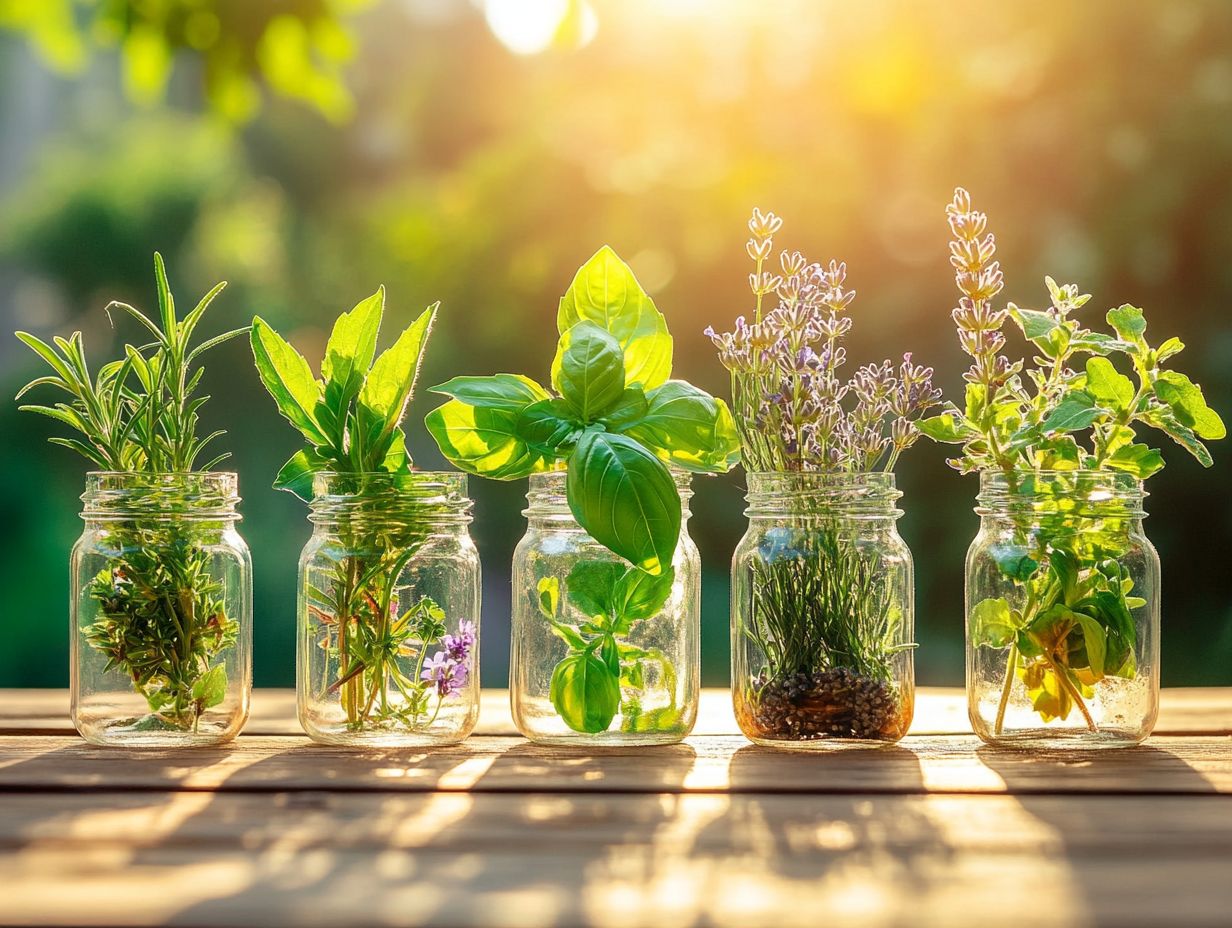
Saffron is one of the world s most luxurious spices. It can enhance mood and help ease symptoms of depression.
This striking crimson stigma comes from the Crocus sativus flower. It has been a cornerstone of traditional medicine in many cultures.
The active compounds in saffron, especially crocin, have drawn interest from many studies. These studies show saffron’s promising antidepressant properties.
To incorporate saffron into your daily routine, try these options:
- Sprinkle it into your dishes for flavor.
- Brew it into a soothing herbal tea.
- Use it to enhance desserts visually and tastefully.
Each method naturally boosts your emotional state and adds a touch of luxury to your daily life.
5. Ginkgo Biloba
Ginkgo Biloba is an ancient herb known for promoting mental health. It enhances thinking skills and supports emotional well-being, especially in those experiencing age-related mental decline.
This remarkable plant has been a staple in traditional medicine for centuries, especially in Asian cultures. People have revered it for improving memory and concentration.
Research shows that Ginkgo Biloba may improve blood circulation by widening blood vessels and lowering blood thickness. This benefits both thinking skills and endurance.
However, be cautious. Ginkgo can interact with some medications and increase the risk of bleeding, especially if you’re on blood-thinning medications. Always consult a healthcare provider before starting any supplements.
What Are the Benefits of Using Herbs for Mood Enhancement?
Using herbs to enhance mood offers many benefits. They provide natural support for mental health and help ease anxiety and depression.
These benefits arise from their natural ability to help your body manage stress. Ashwagandha is known for lowering cortisol, while rhodiola boosts energy and resilience against stress.
St. John’s Wort is frequently mentioned as an effective alternative to traditional antidepressants. Some people report that lemon balm calms the mind and boosts thinking skills.
Be sure to approach these herbal allies with care. It’s crucial to consult with professionals before starting any herbal regimen to ensure safety and effectiveness.
How Do These Herbs Work to Boost Mood?
Herbs like St. John s Wort, Ashwagandha, and Lemon Balm work together to elevate your mood. They influence neurotransmitter levels, ease anxiety, and provide support for managing stress.
These herbs affect key neurotransmitters like serotonin and dopamine, helping to restore balance and create a sense of well-being. For example, St. John s Wort makes more serotonin available, while Ashwagandha helps your body manage stress by regulating cortisol levels.
Additionally, nutrients like Vitamin D and Omega-3 fatty acids are crucial for brain health. They help create neurotransmitters and fight inflammation, often linked to mood disorders. Embrace this holistic combination of mood-enhancing herbs and vital nutrients to manage anxiety and depression effectively.
Start exploring these herbs today and elevate your mood naturally!
Are There Any Risks or Precautions to Consider?

While herbal remedies can boost your mood, consider the potential risks and precautions. Herbs like St. John s Wort and Kava Kava may interact with medications.
These herbs could lead to adverse reactions, such as gastrointestinal disturbances or increased sensitivity to sunlight, particularly when taken without supervision. If you have pre-existing health conditions, like liver disorders, or are on antidepressants, extra caution is essential.
Before diving into these herbal options, consult with a healthcare provider to ensure safe usage and explore alternatives. Being well-informed about the specific side effects and risks associated with each herb can enable you to make healthier choices and prevent potential complications.
Can These Herbs Be Used in Conjunction with Other Medications?
Herbs can interact with medications. For instance, St. John’s Wort may reduce the effectiveness of antidepressants and birth control pills. SAMe might amplify the effects of certain antidepressants, leading to elevated serotonin levels.
If you re contemplating incorporating herbs into your treatment plan, it s wise to first consult healthcare professionals, including your doctors and pharmacists, to evaluate any potential interactions thoroughly.
Talking openly about your herbal use enhances safety and enables your healthcare providers to tailor their recommendations. This ensures that your treatments work in harmony, contributing to a holistic approach to your wellness journey.
How Can One Incorporate These Herbs into Their Daily Routine?
Incorporating herbs like Lemon Balm, Chamomile, and Lavender into your daily routine is an easy way to lift your mood. These can be enjoyed as teas, tinctures (liquid extracts of herbs), or supplements.
Imagine brewing a soothing cup of Chamomile tea before bedtime; it becomes a calming ritual that sets the stage for restful sleep. If you find yourself needing a midday boost, a refreshing Lemon Balm infusion can work wonders, alleviating stress and sharpening focus.
Lavender tinctures are another excellent choice; add them to your morning smoothie or take them directly to foster a sense of tranquility throughout your day. Pairing these herbal preparations with mindful practices think deep breathing exercises or gentle yoga can significantly amplify their benefits.
By establishing a consistent routine, you not only nurture your body but also enhance your overall sense of well-being!
Which Herb Is Best for Each Individual’s Specific Needs?
Choosing the right herb for your mood is personal. Options like Kava Kava, Passionflower, and Wu Wei Zi offer unique benefits to match various needs.
Each of these herbs boasts unique properties that can cater to your emotional landscape. For example, Kava Kava shines in alleviating anxiety and promoting relaxation, making it an excellent choice if you re wrestling with stress or tension. Conversely, Passionflower is renowned for its calming effects, which can be particularly beneficial if you re struggling with insomnia or hyperactivity. On the other hand, Wu Wei Zi is celebrated for its potential to uplift overall emotional well-being, especially for those grappling with fatigue or burnout.
To help you navigate this selection process, consider using a comparison chart that outlines these characteristics alongside specific conditions. This can provide clarity and inspire you to reflect on your individual circumstances before making a decision.
Frequently Asked Questions
What are the top 5 herbs to boost your mood?
Here are the top 5 herbs to boost your mood: ashwagandha, St. John’s Wort, rhodiola, chamomile, and lavender.
How does ashwagandha improve mood?
Ashwagandha is an herb that helps your body handle stress, which can improve your mood. It also balances hormones, reducing mood swings.
Can St. John’s Wort be used as a natural mood enhancer?
Yes! St. John’s Wort is known as a natural mood enhancer because it boosts serotonin levels, the mood-regulating neurotransmitter.
What is the best way to consume rhodiola for mood benefits?
Rhodiola can be taken as capsules, tinctures, or teas. Consult with a healthcare professional to find the best option and dosage for you.
Can chamomile tea really improve mood?
Absolutely! Chamomile is famous for its calming effects, easing anxiety and promoting relaxation to elevate your mood.
How does lavender help with mood?
Lavender is beloved for its calming properties. It helps reduce stress and improve sleep, leading to a better mood overall.

